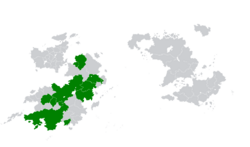Bank for United Development: Difference between revisions
| Line 27: | Line 27: | ||
== History == | == History == | ||
== Organisation == | |||
=== Corporate governance === | |||
=== Mission and objectives === | === Mission and objectives === | ||
The Treaty of Karatan, which founded the BDU, stated that the primary mission statement of the bank is to “provide the appropriate loans, guarantees, equity participation and other financial instruments to member-states and approved third-parties, in support of both public and private projects.” The treaty and the bank’s charter further states that this will be done in a “manner that promotes sustainability, that present meaningful and impactful benefits for member-states and to be done in a manner that also seeks to see social and developmental returns.” | |||
The charter notably includes the following, “the bank will not, either from external or internal pressures, place pre-conditions on transactions or projects that are inherently: 1) political 2) sectarian 3) ideological 4) discriminatory 5) maximalist.” | |||
The charter however states: “the bank is tasked with assisting and supporting public and private projects that are socially, environmentally and economically sustainable.” | |||
== Activities == | == Activities == | ||
=== Projects === | === Projects === | ||
Revision as of 23:27, 12 November 2020
 | |
 | |
| Abbreviation | BUD, BDU |
|---|---|
| Type | International Financial Institution |
| Legal status | Treaty |
| Headquarters | Baiqiao, Xiaodong |
Membership | |
Official language | Gaullican |
President | Wen Kezhi |
Parent organization | International Forum for Developing States |
| Website | www |
The Bank for United Development (Gaullican: Banque pour le Développment Uni) is an multilateral development bank established by the member-states of the International Forum for Developing States in "TBD", through the Treaty of Karatan. According to the founding treaty, the responsibility and focus of the bank is to "support public and private projects, through loans, guarantees, equity participation and other financial instruments. With constructive and responsible advisement, promotion and beneficial frameworks."
The bank was founded with the pre-agreed initial authorised capital of €220 billion divided into 20,000 shares worth €1 million each. A further €10 billion was assigned to the bank itself for independent use of the member-states. The initial subscribed capital of the BDU is $80 billion divided into callable shares ($60 billion) and paid-in shares ($20 billion). The charter of the BDU grants each member one-vote and no member possesses a veto. The bank is subject to limited oversight or management by its parent, the IFDS and access to the bank's financial products is not limited to IFDS member-states, though permission for outside access from the member-states is required.
The BDU is widely seen as a rival and competitor to the Global Institute for Fiscal Affairs. It is headquartered in Baiqiao, Xiaodong.
History
Organisation
Corporate governance
Mission and objectives
The Treaty of Karatan, which founded the BDU, stated that the primary mission statement of the bank is to “provide the appropriate loans, guarantees, equity participation and other financial instruments to member-states and approved third-parties, in support of both public and private projects.” The treaty and the bank’s charter further states that this will be done in a “manner that promotes sustainability, that present meaningful and impactful benefits for member-states and to be done in a manner that also seeks to see social and developmental returns.”
The charter notably includes the following, “the bank will not, either from external or internal pressures, place pre-conditions on transactions or projects that are inherently: 1) political 2) sectarian 3) ideological 4) discriminatory 5) maximalist.”
The charter however states: “the bank is tasked with assisting and supporting public and private projects that are socially, environmentally and economically sustainable.”